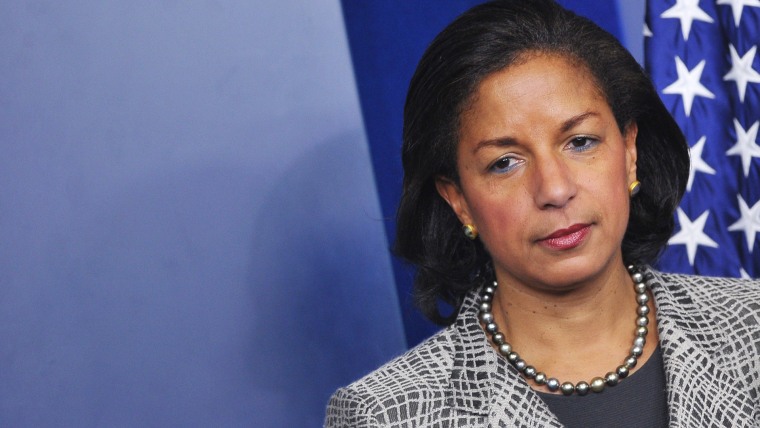There's something about former White House National Security Advisor Susan Rice that seems to send Republicans in unhealthy directions. Donald Trump, for example, invested quite a bit of energy last year in trying to smear the Obama-era aide, before his claims completely unraveled.
Before that, a variety of GOP officials targeted Rice with truly bizarre conspiracy theories involving the 2012 attack in Benghazi, each of which were discredited.
Politico reported yesterday on the new Republican offensive against Rice.
Former President Barack Obama suggested in January 2017 that information related to a federal probe of Russian election interference might have to be withheld from aides to then-President-elect Donald Trump, according to an internal White House email released Monday by two senior GOP senators.The warning Obama delivered on Jan. 5, 2017, came during an Oval Office conversation shortly after senior intelligence officials briefed him on Russian cyber-meddling in the 2016 election. It was documented in an email then-national security adviser Susan Rice sent to herself on Jan. 20, the day of Trump's inauguration.Portions of the email were released Monday by Sens. Chuck Grassley (R-Iowa) and Lindsey Graham (R-S.C.), who called the missive "odd" and "unusual."
As one might expect, conservative media has embraced this as some kind of new Rice-related controversy.
So, let's unpack the story, because it's important -- not just to events that unfolded over a year ago, but also to the ongoing Trump-Russia scandal.
Rachel's segment on this last night is well worth your time, but for those who missed it, the stroll down memory lane is clarifying.
It was 2016 when U.S. intelligence agencies recognized that Russia was intervening in the American elections, hoping to elect Moscow's preferred candidates. The plan, we now know, worked and Putin's government got the outcome it hoped for.
At that point, the then-White House national security advisor, Susan Rice, found herself in a difficult position: she had a responsibility to help with the transition process, helping prepare her successor to take over her duties, but Donald Trump had chosen Michael Flynn for the post.
He was an unwise pick. Barack Obama had just announced new sanctions against Russia for its attack on our democracy, prompting Russian officials to put in a private call to their pal, Michael Flynn. Trump's incoming national security advisor apparently told the Russians not to worry too much about those sanctions Obama had just imposed on them, because Team Trump would take power and change U.S. foreign policy.
All of this was caught by U.S. surveillance, which meant Rice, in her capacity as the White House national security advisor, knew that her incoming successor had already engaged in dubious communications with the country that had just attacked the United States, casting doubt on the just-announced sanctions.
You can probably imagine why Rice, who was supposed to be helping get Flynn ready, found herself in an awkward position. How would she prepare Flynn to help oversee some of the nation's most sensitive secrets?
Indeed, we later learned that the entire Obama White House wasn't sure how best to deal with this unprecedented situation. And so, on Jan. 5, 2017 -- two weeks before Inauguration Day -- there was a classified intelligence briefing for the president and a small group of top White House officials from the FBI director, the CIA director, and the director of national intelligence. Among other things, they discussed the FBI's investigation into the incoming national security adviser.
We now know a fair amount about that meeting because Rice wrote up a summary, which was been partially declassified. The then-national security advisor wrote at the time that Obama stressed that when it came to the investigation, he expected the law enforcement team to proceed "by the book," just as "it normally would."
As for the transition, Obama added, according to Rice's write-up, that officials should be "mindful to ascertain if there is any reason that we cannot share information fully [with Trump's team] as it relates to Russia."
According to Lindsey Graham and Chuck Grassley, the "odd" and "unusual" part of this is that Susan Rice documented the meeting in written form.
What actually seems odd is that Donald Trump chose a White House national security advisor who was the subject of an FBI investigation as a result of his ties to Russia, leaving the outgoing administration unsure just how much it could safely share with the incoming administration without jeopardizing American national security.
If your concern is that Susan Rice memorialized in a memo some of the decision-making processes around this unusual time, perhaps you've lost sight of what's important here.
Postscript: We posted Rice's partially declassified memo on the site last night.
